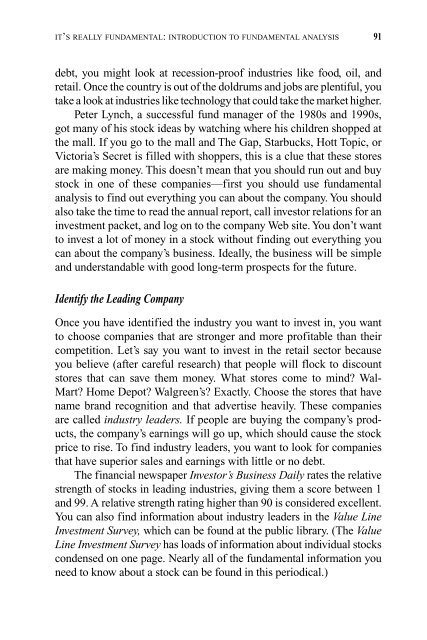Understanding Stocks
Understanding Stocks
Understanding Stocks
You also want an ePaper? Increase the reach of your titles
YUMPU automatically turns print PDFs into web optimized ePapers that Google loves.
IT’S REALLY FUNDAMENTAL: INTRODUCTION TO FUNDAMENTAL ANALYSIS 91<br />
debt, you might look at recession-proof industries like food, oil, and<br />
retail. Once the country is out of the doldrums and jobs are plentiful, you<br />
take a look at industries like technology that could take the market higher.<br />
Peter Lynch, a successful fund manager of the 1980s and 1990s,<br />
got many of his stock ideas by watching where his children shopped at<br />
the mall. If you go to the mall and The Gap, Starbucks, Hott Topic, or<br />
Victoria’s Secret is filled with shoppers, this is a clue that these stores<br />
are making money. This doesn’t mean that you should run out and buy<br />
stock in one of these companies—first you should use fundamental<br />
analysis to find out everything you can about the company. You should<br />
also take the time to read the annual report, call investor relations for an<br />
investment packet, and log on to the company Web site. You don’t want<br />
to invest a lot of money in a stock without finding out everything you<br />
can about the company’s business. Ideally, the business will be simple<br />
and understandable with good long-term prospects for the future.<br />
Identify the Leading Company<br />
Once you have identified the industry you want to invest in, you want<br />
to choose companies that are stronger and more profitable than their<br />
competition. Let’s say you want to invest in the retail sector because<br />
you believe (after careful research) that people will flock to discount<br />
stores that can save them money. What stores come to mind? Wal-<br />
Mart? Home Depot? Walgreen’s? Exactly. Choose the stores that have<br />
name brand recognition and that advertise heavily. These companies<br />
are called industry leaders. If people are buying the company’s products,<br />
the company’s earnings will go up, which should cause the stock<br />
price to rise. To find industry leaders, you want to look for companies<br />
that have superior sales and earnings with little or no debt.<br />
The financial newspaper Investor’s Business Daily rates the relative<br />
strength of stocks in leading industries, giving them a score between 1<br />
and 99. A relative strength rating higher than 90 is considered excellent.<br />
You can also find information about industry leaders in the Value Line<br />
Investment Survey, which can be found at the public library. (The Value<br />
Line Investment Survey has loads of information about individual stocks<br />
condensed on one page. Nearly all of the fundamental information you<br />
need to know about a stock can be found in this periodical.)

















